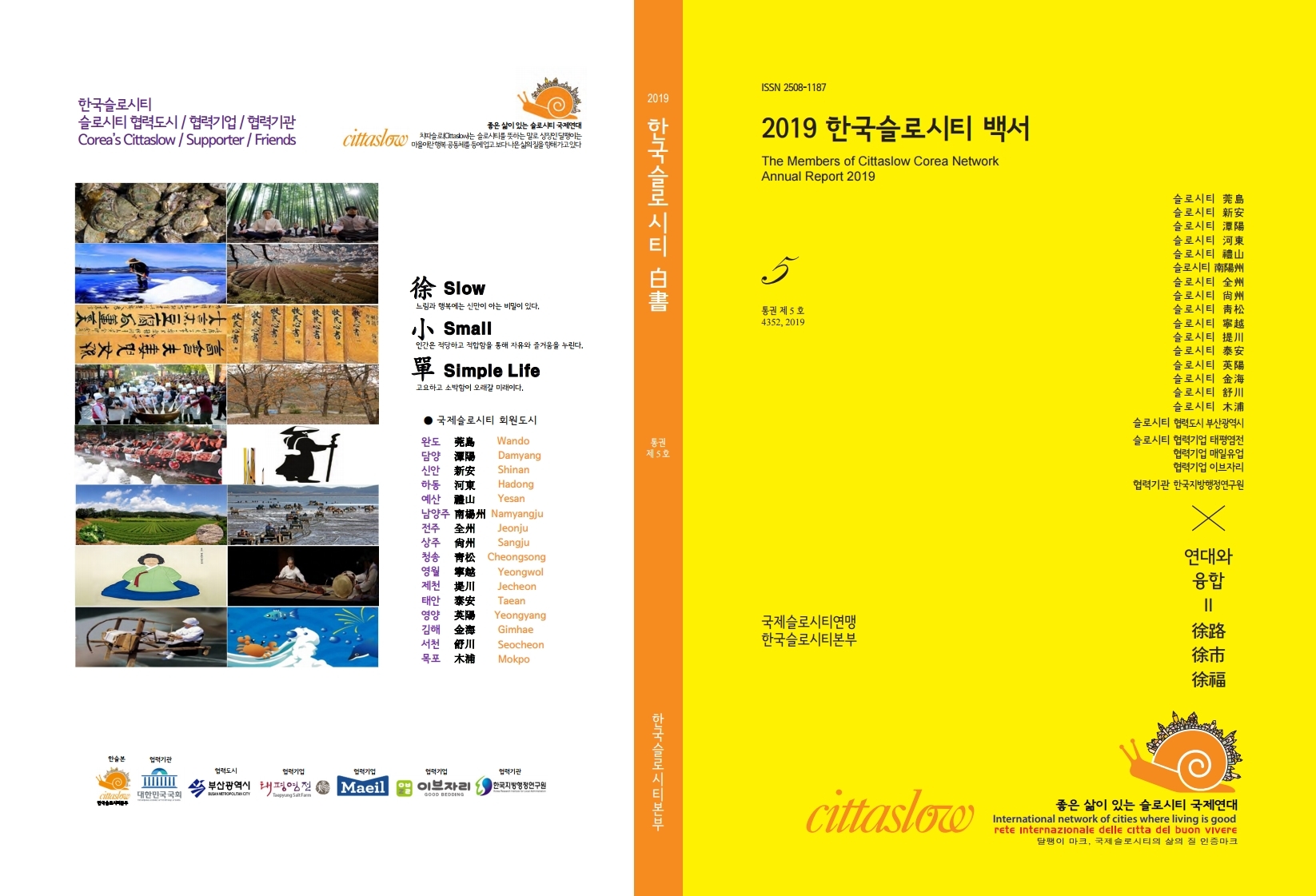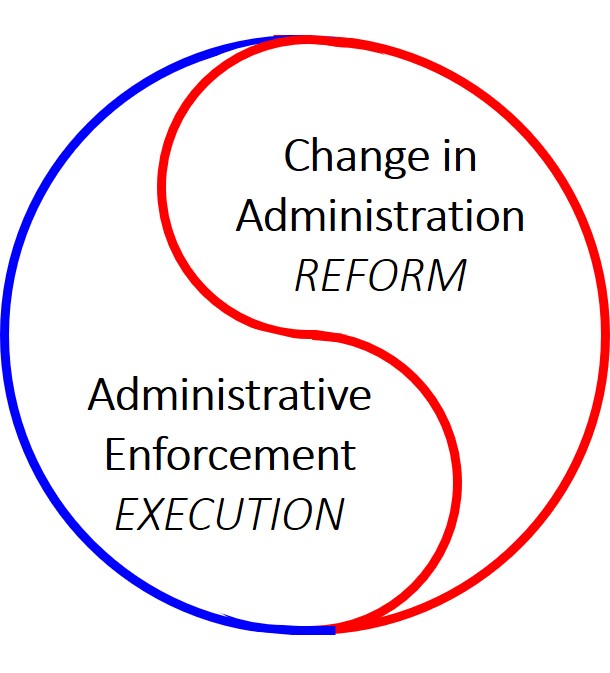March
CCN (COR): CITTASLOW COREA NETWORK ANNUAL REPORT 2019
The Cittaslow Corea Network has published annual reports since 2015 to help Corea’s member towns share the good practices, analyze, and establish policy and strategies for Cittaslow. The Annual Report 2019 (Vol. 5; 323 pages) was distributed to member towns’ governments and Cittaslow resident councils, Cittaslow Supporters, Cittaslow Friends, the National Assembly Cittaslow Forum, and the Ministry of Culture, Sports, & Tourism. The contents include the introduction of Cittaslow, the activities and events of member towns in Corea and abroad, the performances of member towns in Corea, and appendices.
Publisher: The Cittaslow Corea Network
Language: Corean (text) / English (preface & contents)
ISSN: 2508-1187

ANNUAL REPORT 2019 PREFACE
by Prof. bon sohn Coordinator of the CCN
All populations in the global community are in an emergency, while fine dust and global warming have caused the outbreak of various viruses. Even the cause of the currently circulating virus in China is unknown, and the reckless countermeasure is nothing but a makeshift such as peeing on the frozen feet. The problem is that more virus outbreaks will attack mankind in the future. Corea also suffers the worst ever air pollution from ultra-fine dust while air quality is directly related to our lives. Due to climate change and global warming, forests have been dried up and forest fires have increased eight-fold; bushfires have been burning across Australia over eight months since June 2019. It has rarely snowed in Seoul and Gangwon-do, and we haven’t had any severely cold temperature across the nation this winter, that extinguishes the reputation of a popular winter destination in Asia. Have there been actually any small changes since introducing Cittaslow to Corea? Change is action, and today is the future. Cittaslow needs to affect any external and internal change in their life, family, and community in the town. As shown in the figure, in order to successfully drive a dynamic system, there should be a balance between two important activities, change in administration (reform) and administrative enforcement (execution) like the mark of Taegeuk* even in a dynamic environment. Cittaslow towns in Corea need to fight climate change as a missionary of the times. In particular, Corea is one of the four global climate villains. The high concentration of ultra-fine dust is mainly caused by carbon dioxide emission, which is an automobile exhaust gas. Now, we need to take active measures and actions; fewer cars, replacement of fossil fuels, lesser meat, and a low-carbon economic system. Portland, USA, a symbol of a transition city, is implementing a plan to create 16 percent of its urban area as a park.

* Taegeuk is a traditional Korean symbol and represents the balance in the universe: the red half represents positive cosmic forces, and the blue half represents the opposing negative cosmic forces.
Personality and genes are grace and blessing. Psychologist Carl Jung (1875~1961) describes the individuation as the process where the individual self develops out of an undifferentiated unconscious. Humans have their own genes. The individuation and genes of each Cittaslow town are ‘Bunbok’, destined luck (its own heritage). Bunbok is literally ‘sharing luck.’ All that I have received is a gift that has been endowed and must be endowed to other people. While the 20th century was the age of centralization and centralization, the 21st century is the age of small and local towns. Cittaslow and Cittaslow Food is the spirit of the times, and if we do not protect locality, localism and local culture in the global era, globalization will end up with the globe being homogenized, and the local communities will lose their color. Cittaslow's direction is ‘Think globally, act locally.’ In Corea, one of two people live in the metropolitan area, and population decline is a serious problem in many rural areas. Under these circumstances, cooperation means that the central or local governments do their jobs only according to the guidelines given to them, as well as residents. Now the cooperation is a has-been, and the collaboration that features conversations and debates is an evolution. It is time to experiment with national sovereignty and autonomy and help democracy flourish in the local communities. In the 17th century, the Baekho Village in the city of Yeoju in Corea was a village republic, set up Hyangyak (contractual arrangement), established the village’s social safety net for quality of life, and operated a lifelong educational institution for the solidarity of people. We need to assign a theme to some qualified small towns on the selection and concentration logic. Many small towns still have roads, lanes across paddy fields, mountain paths, water paths, forest paths, and uphill paths. The road is pronounced ‘gil’ in Corean, and the same with another word ‘吉’ that means ‘happy or pleased.’ Therefore, the road is a thing that makes people happy.
As the modern economy brought about the crisis of climate and human survival, we should abandon the wrong development view that emphasizes means rather than ends and turn to ecological civilization and become eco-citizens. In the fast-changing digital age, we need to quickly turn to the solidarity of people, not the solidarity of money, the solidarity of life, and the time sovereignty that people go to work at 8 o'clock and leaves at 4 or work from Monday to Thursday like Germany and Sweden. Restoring human conditions in the age of machines requires being good citizens and enjoying good lives. The point of the life of advanced citizens is not just to live, but to sublimate life into art. We already know the marketing secret of how the product of Cittaslow can become a brand.
According to the data submitted in the Cittaslow Corea Annual Report 2019, Jeonju is dedicated to the Cittaslow Team and Gimhae is the Cittaslow Policy Team. It is Damyang, Hadong, and Shinan that have the most notable resident activities while Taean, Jeonju, and Gimhae have the Cittaslow Steering Committee that is composed of residents and experts. In order to properly recognize and study Cittaslow, education programs were conducted for public officials and residents in Gimhae 7 times, Jeonju and Hadong 3 times, Taean and Seocheon 2 times, and Shinan, Damyang, Yesan, and Jecheon one time, while no education program was conducted in Wando, Sangju, Cheongsong, Yeongwol, and Yeongyang. Gimhae, Hadong, and Taean participated in two certification courses, and Shinan and Damyang one respectively. Gimhae produced 10 citizen instructors (Jeonju, eight citizen instructors in 2018). For achievements and changes in the quality of life and a happier life for residents, Shinan established the Jeungdo Cittaslow Steering Committee, Hadong operates ‘Nolluwa’, a fair travel agency run by residents and a cooperative, Yesan operates the cooperative ‘Slow Hands’, Jeonju published a casebook ‘Changes in Cittaslow Jeonju for Ten Years’, Jecheon established the Second Cittaslow Development Plan, and Yeongyang established ‘Basic Plan for Cittaslow Yeongyang.’